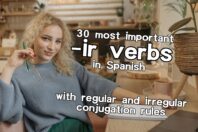Poner In English: 8 Different Meanings for 1 Spanish Verb

Get our free email course, Shortcut to Conversational.
Have conversations faster, understand people when they speak fast, and other tested tips to learn faster.
More infoWhen you Google translate the Spanish verb Poner in English, you’ll likely be told that this verb means “to put”, which is true. However, as you engage with more native speakers, and become more exposed to Spanish in general, you’ll notice that this verb is quite versatile and can be applied to several scenarios.
The same applies to its reflexive form, Ponerse.
In addition to this, poner is an important part of many common phrases that native speakers use on a daily basis, for example, ponerse de pie (to stand by).
Before we dive into the many different uses of poner, let’s quickly recap the conjugation.
Poner Conjugation
Poner in an irregular verb and in the simple present tense belongs to a category often referred to as go verbs in Spanish, which means when conjugated in the present indicative, the first person (yo) form ends in “go”.
| Personal Pronouns | Poner Conjugation | To put |
| Yo | pongo | put |
| Tú | pones | put |
| Él/ella/usted | pone | puts |
| Nosotros/as | ponemos | put |
| Ustedes | ponen | put |
| Ellos/as | ponen | put |
And now, the reflexive form: ponerse
| Personal Pronouns | Ponerse Conjugation | To put oneself / To wear / To put on |
| Yo | me pongo | put myself |
| Tú | te pones | put yourself |
| Él/ella/usted | se pone | puts it/him/herself |
| Nosotros/as | nos ponemos | put ourselves |
| Ustedes | se ponen | put yourself |
| Ellos/as | se ponen | put themselves |
What does Poner mean?
In the following sections, we’ll explore the many different translations and meanings for Poner in English.
1) Placing objects/animals/people or arranging
Just as you use the “to put” in English, verb poner is used to place objects, animals or people somewhere:
- My housewife always puts the keys on the desk. – Mi ama de casa siempre pone las llaves en el escritorio
- I put my notebooks in my backpack last night. – Yo pusé los cuadernos en mi bolso anoche.
- She put her glasses in the car – Ella colocó los lentes en el carro.
- My friends always put ice on their drinks. – Mis amigos siempre ponen hielo en sus bebidas.
- My cousin doesn’t put the wallet in my pocket. – Mi primo no puso la cartera en mi bolsillo.
Sidenote: As you can see in the third example the verb “colocar” is used instead of “poner”, as both are interchangeable in this context.
2) Putting on clothes
You must use the reflexive ponerse when talking about putting something on yourself.
- Frank will put on his favorite suit in Christmas. – Frank se pondrá su traje favorito en Navidad.
- I didn’t put on my hat yesterday, I totally forgot it. – No me puse el sombrero ayer, lo olvidé por completo.
- My girlfriend put on a beautiful dress on her birthday. – Mi novia se colocó un hermoso vestido en su cumpleaños.
- Anna doesn’t put on her glasses when she drives. – Anna no se pone los lentes cuando ella maneja.
- Veronica puts on a colorful wig. – Verónica se pone una peluca colorida.
Sidenote: Once again the verb “colocar” can be used instead of “poner” in the 3rd example.
3) Becoming Something
This one doesn’t have a direct translation in English.
In this case, we use the verb poner to describe having an emotional reaction, or how you feel about something or a situation.
- Suddenly, Ana became sad, maybe loneliness invaded her – De repente, Ana se puso triste, quizá la invadió la soledad
- He became shy when the girl he likes walked into his office – Se puso tímido cuando la chica que le gusta entró en su oficina
- I think she became happy because she is pregnant -Creo que ella se puso feliz porque está embarazada
- I sometimes become disappointed when people lie to me – A veces me pongo decepcionado cuando las personas me mienten
- My friends become excited when they get good grades – Mis amigos se ponen emocionados cuando ellos tienen calificaciones buenas
4) Investing money
You can use poner when talking about investing money in something, or even gambling.
- If we invest $300 in this bank account, in a year we will receive $30 – Si ponemos 300$ en esta cuenta bancaria, en un año recibimos 30$.
- My father gambled $1 on the Wheel of Fortune game at the casino – Mi papá puso 3 dólares en el juego de La Rueda de la Fortuna en el casino.
- Did you gamble $1,000 for a soccer match? – ¿Pusiste 1.000$ por un partido de fútbol?
- You should invest more money on your saving account – Deberías poner más dinero en tu cuenta de ahorros
- My brother gambled all his money on a game and he lost everything – Mi hermano puso todo su dinero en un juego y perdió todo
5) Showing Something
Poner is used to talk about something that is being displayed or showing (on TV, on social media).
- What’s on Netflix tonight? – ¿Qué ponen esta noche en Netflix?
- You have a beautiful profile picture, put it on your website! – Tienes una hermosa imagen de perfil, ¡Ponla en tu sitio web!
- HBO is showing Games of Thrones. – HBO están poniendo Games of Thrones.
- Did you put your picture on Facebook? – ¿Pusiste tu foto en Facebook?
- Warner Channel won’t be showing Arrow season 7 – Warner Channel no estará poniendo Arrow temporada 7.
6) Calling Somebody or Something A Name
This will probably sound odd if you are a native English speaker, but the verb poner is also used to call someone a name or a nickname (also works for animals/pets).
- My wife decided to call my son Gabriel, because it’s her father’s name. – Mi esposa decidió ponerle a mi hijo Gabriel, porque es el nombre de su padre
- If I have a son, I will call him like my father. – Si tengo un hijo, le pondré como mi padre
- My mother decided to call me Ed, because she loves Ed Sheeran a lot. – Mi mamá decidió ponerme Ed, porque ella ama a Ed Sheeran mucho
- My friend bought a dog and he called her Primrose. – Mi amigo compró una perra and le puso Primrose
- My friend’s girlfriend called him “Penguin” as a cute nickname. La novia de mi amigo le puso “Pingüino” como un apodo tierno
7) Effecting change
For actions that require a change, you can use the verb poner.
- The French teacher put an end to the bullying in the classroom – El profesor de francés puso final al acoso escolar en el salón
- My neighbours decided to put the car up for sale – Mis vecinos decidieron poner en venta su carro
- I put the car in reverse to park at school and pick my brothers up – Puse el carro en reversa para estacionarme en el colegio y recoger a mis hermanos
- The biceps femoris injury put Messi in trouble – La lesión del bíceps femoral puso en aprietos a Messi
8) Phrases using Poner
And finally, there are most common phrases that use the verb poner, which you should learn in order to sound more like a native speaker. Some of these are idioms, others are slang commonly used in daily conversation. You’ll notice that some of these expressions have an equivalent in English.
- Ponerse de pie (to stand up): Can you stand up and give us your point of view? ¿Puedes ponerte de pie y darnos tu punto de vista?
- Ponerse de rodillas (to kneel): My friend kneeled and they arrested him – Mi amigo se puso de rodillas y lo arrestaron.
- Ponerse rojo o colorado (to feel embarrassed or ashamed, to blush or turn red): When my fiancé asked me to marry, I turned red -Cuando mi prometido me pidió matrimonio, me puse roja.
- Poner por encima (to prefer): Do you prefer your girlfriend rather than your family? – ¿Pones por encima a tu novia que a tu familia?
- Poner en juego (to put in danger): Are you to put in danger our friendship? ¿Vas a poner en juego nuestra amistad?
- Poner en marcha (to start): Let’s start working so hard this year – Vamos a poner en marcha y trabajar duro este año
- Poner en claro (to make clear): Can you make clear the explanation of the object pronoun lesson? – ¿Puedes poner en claro la explicación de la lección del pronombre objeto?
- Poner bien a alguien (to have a high opinion of someone): Juan always has a high opinion of his father in every situation – Juan siempre pone bien a su padre en cualquier situación
- Poner en riesgo (to put at risk): Do you prefer putting at risk your life saving a dong lost in the juggle? – ¿Prefieres poner en riesgo tu vida salvando a un perro perdido en la selva?
- Poner huevo (to lay an egg): Kiwis usually lay a big egg. – Los kiwis usualmente ponen un huevo grande.
Spanish Verb Poner: Exercices
Use the verb poner in the following sentences in the right tense either in reflexive or regular conjugation:
1.- Yo (poner en reversa – pasado) el carro con mi mamá ayer. – I put in reverse the car with my mother yesterday.
2.- Juan (ponerse de pie – futuro simple) en frente de miles de personas para explicar la situación de las universidades. – Juan will stand up in front of thousands of people to explain about the university situation.
3.- ¿Tú (poner – futuro próximo) 10$ en el bingo esta noche? – Are you going to gamble $10 on the bingo tonight?
4.- Mi novia (ponerse -presente) un vestido para sus clases de modelaje. – My girlfriend puts on a dress for her modeling classes.
5.- Daniela (poner – presente perfecto) un tenedor en la mesa. Daniela has put a fork on the table.
6.- Las serpientes usualmente comen los huevos que las gallinas (poner – presente simple). – Snakes usually eats eggs that the hens lay.
7.- Mi hermano me dijo que cuando tenga una hija, le (poner – futuro simple) Ashley. – My brother told me that when he has a baby, he will call her Ashley.
8.- Mi papá (ponerse enfadado – pasado simple) cuando descubrió que su hijo tiene malas calificaciones en el colegio. – My father became angry when he found out that his son has bad grades at school.
Answers
1.- Yo puse el carro con mi mamá ayer. – I put in reverse the car with my mother yesterday.
2.- Juan se pondrá de pie en frente de miles de personas para explicar la situación de las universidades. – Juan will stand up in front of thousands of people to explain about the university situation.
3.- ¿Tú vas a poner 10$ en el bingo esta noche? – Are you going to gamble $10 on the bingo tonight?
4.- Mi novia se pone un vestido para sus clases de modelaje. – My girlfriend puts on a dress for her modeling classes.
5.- Daniela ha puesto un tenedor en la mesa. Daniela has put a fork on the table.
6.- Las serpientes usualmente comen los huevos que las gallinas ponen. – Snakes usually eats eggs that the hens lay.
7.- Mi hermano me dijo que cuando tenga una hija, le pondrá Ashley. – My brother told me that when he has a baby, he will call her Ashley.
8.- Mi papá se puso cuando descubrió que su hijo tiene malas calificaciones en el colegio. – My father became angry when he found out that his son has bad grades at school.



